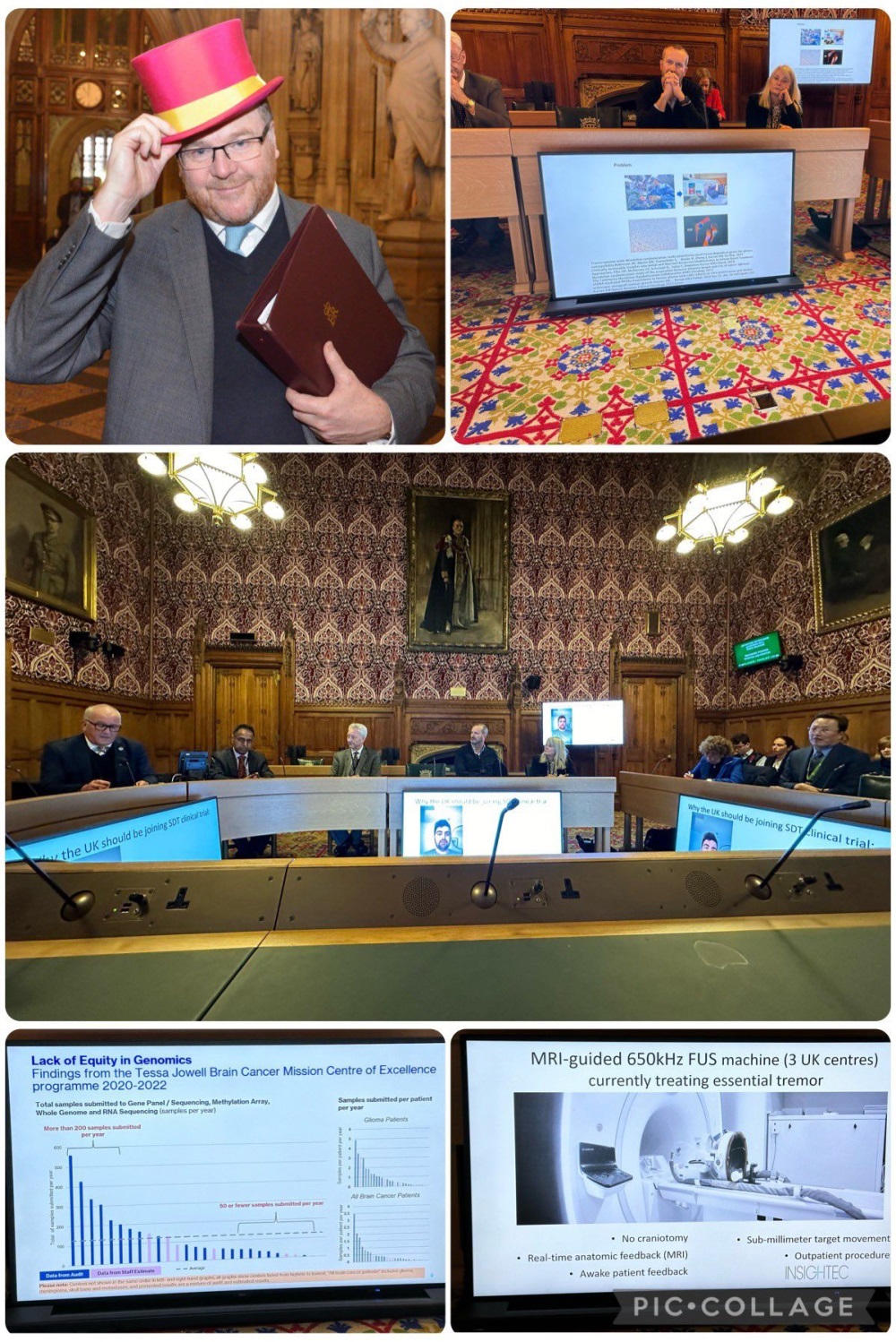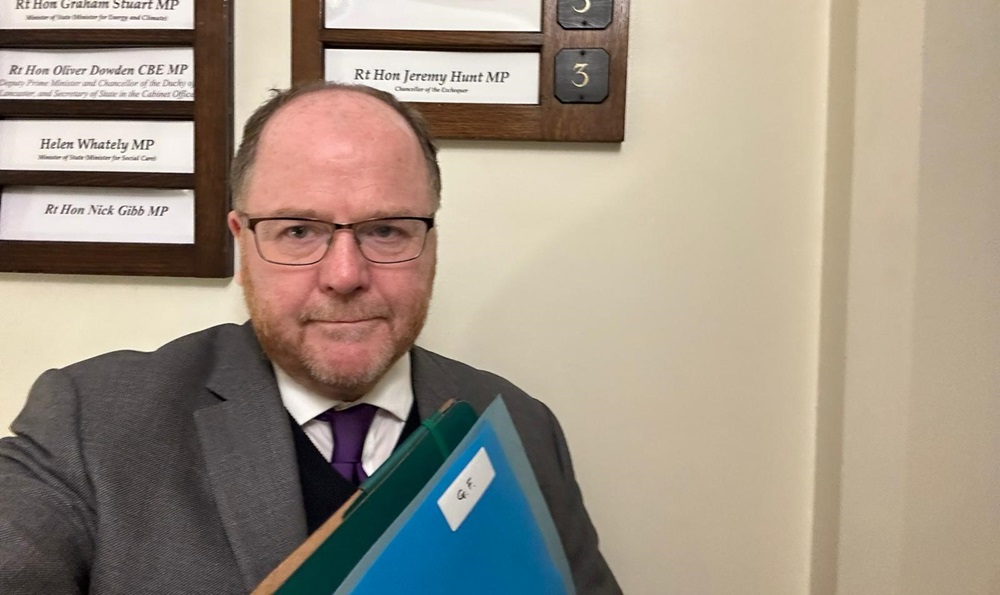
How we take care of, and educate, some of our most vulnerable people is a measure of us as a society. EVERYONE has the right to a good education.
It is vital that local councils have the resources they need to effectively fund and deliver SEND support in our local schools.
That’s why, ahead of this week’s Budget, I have jointly written to the Chancellor, alongside 70 MPs, to ask that he increase funding for SEND education – so that we can ensure SEND pupils have the proper support they need.
See the letter below.
To stay up to date with all of my work on this key issue, please visit my campaign page here

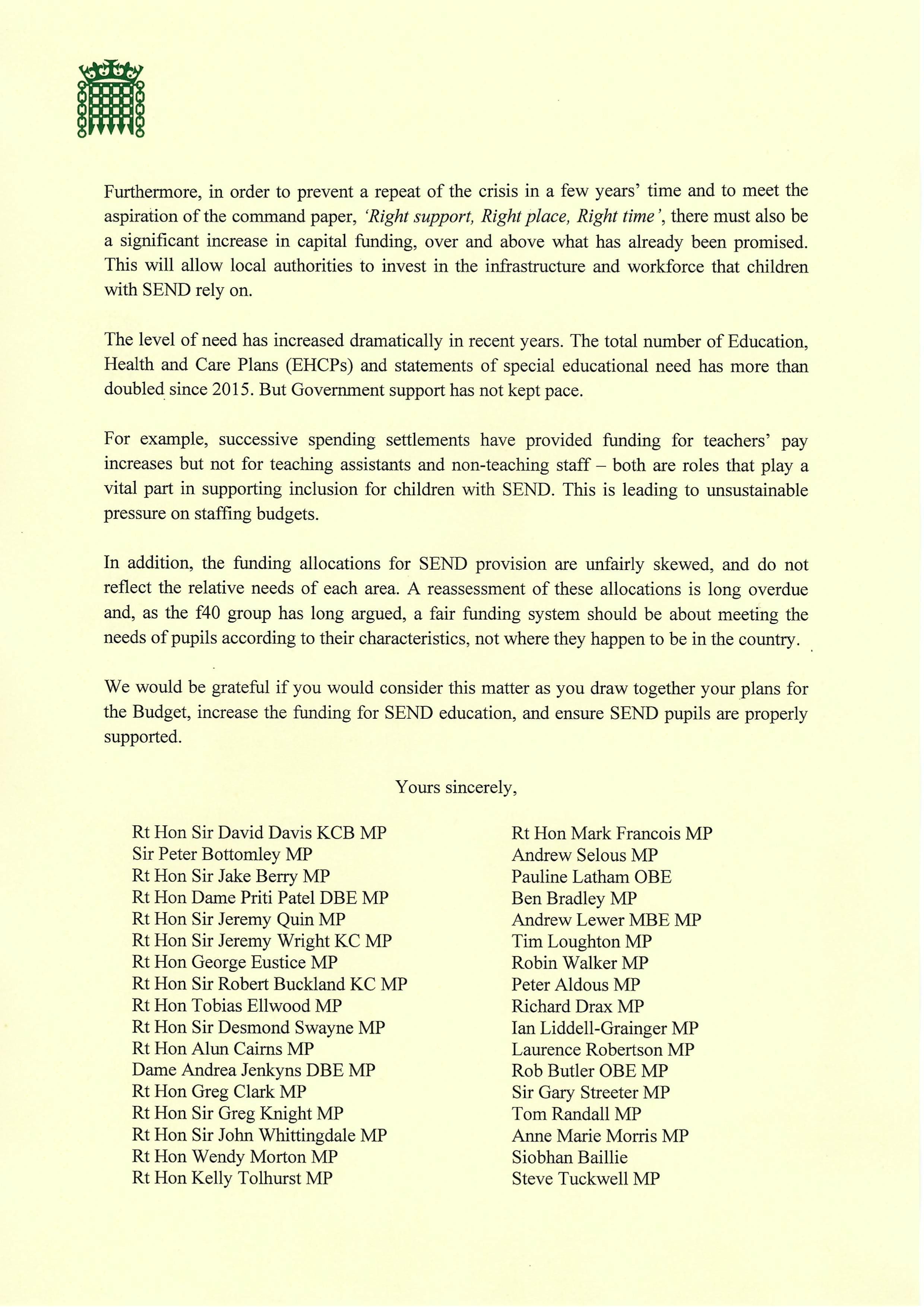
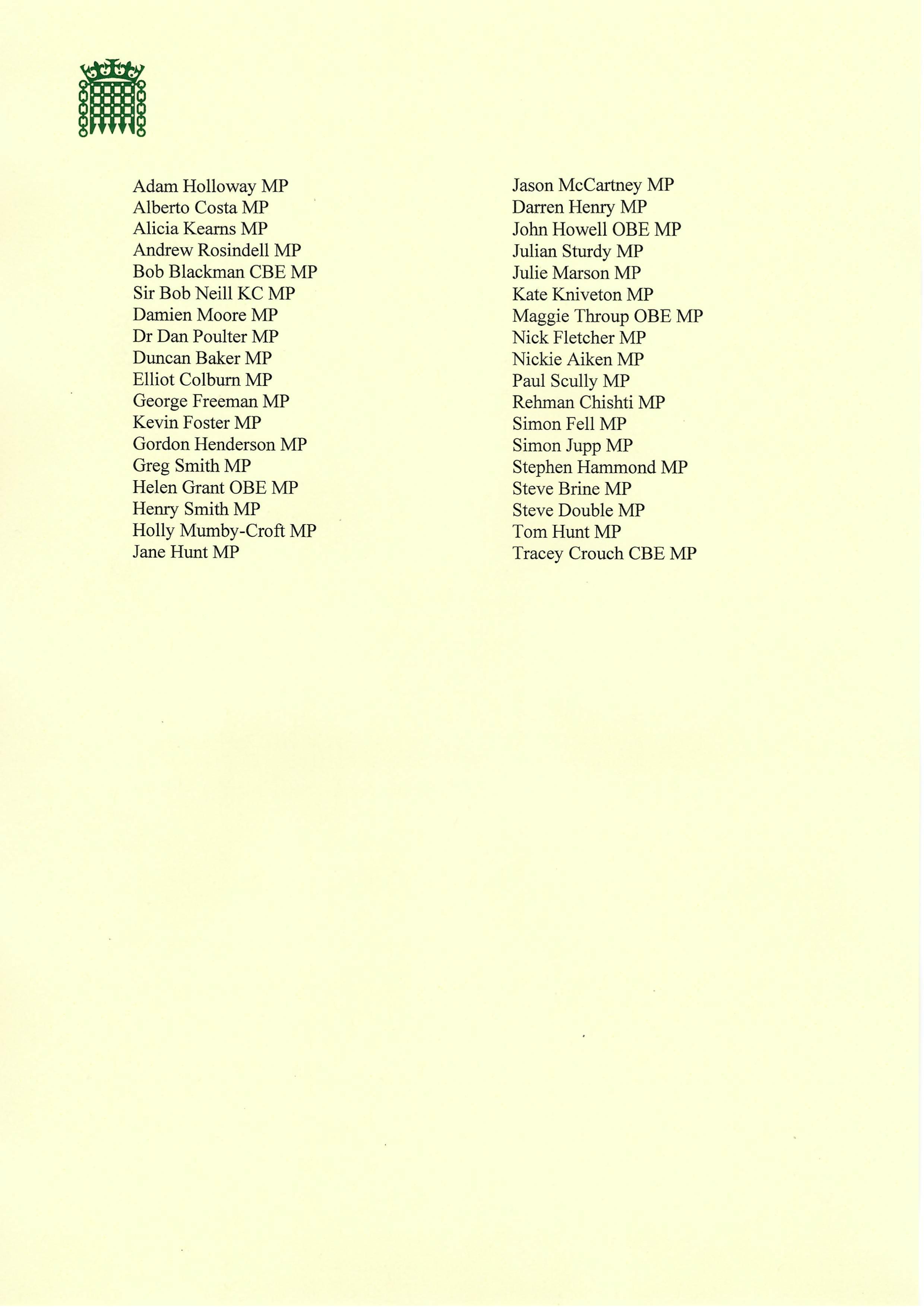
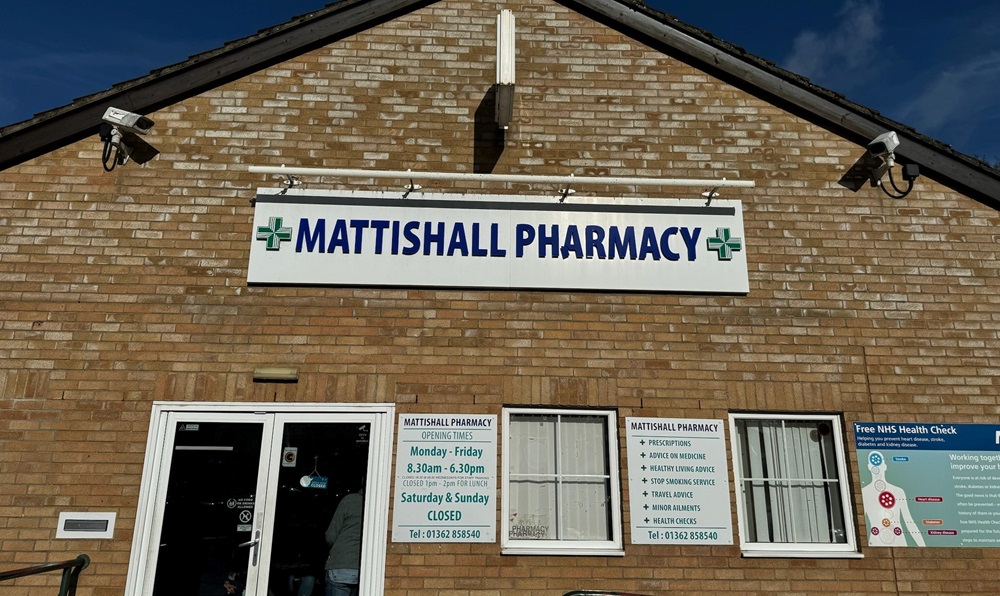
Shouldn’t the NHS be a statutory consultee on all new housing developments?
As I work with GPs across Mid Norfolk to highlight the need for the greater integration of health and social care infrastructure and provision with planning (as is the case for education and planning), I met with the Practice Leadership at Mattishall Surgery and Pharmacy again on Friday – as part of my ongoing work with them to try and help fast track plans for an expansion that would reflect the scale of new housing in our area and enable staff to deliver more top level services, more efficiently.
While I have recently written to ministers and officials in Westminster to pose that key question, I will continue to speak up on behalf of our local GPs – and am committed to supporting Mattishall on this key local project. I am working closely with the Surgeries on a series of follow up actions.
To learn more, please see the webstory on my recent visit to Mattishall Surgery and Pharmacy here.
To find out more about my regular conversations with my Mid Norfolk GP Practice Leaders, please click here
To learn more about similar work I am doing over in Attleborough with the Surgeries and local ATTCARE team, please click here
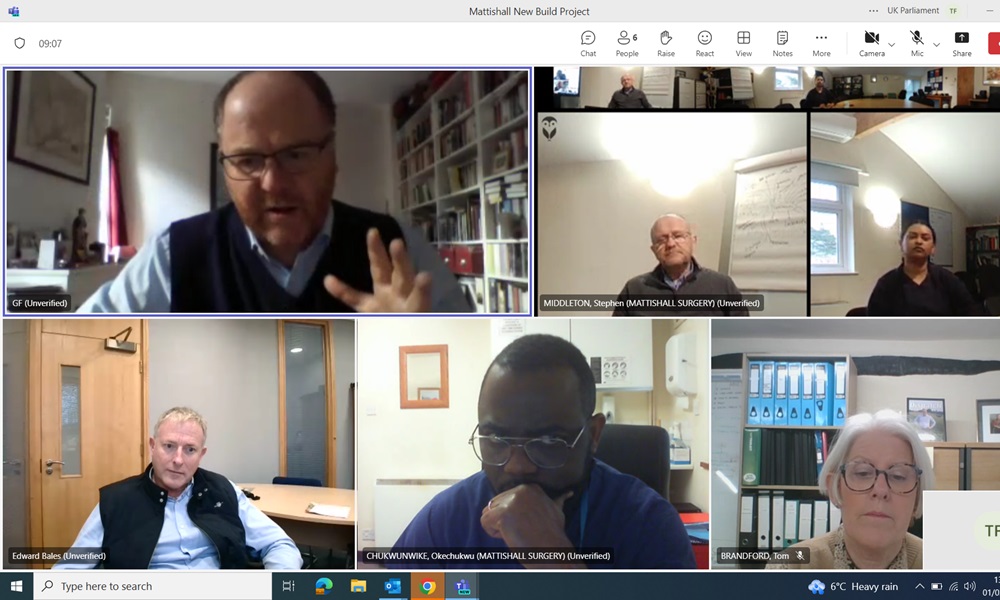
UPDATE - 6 November 2023
Mattishall Surgery and Pharmacy Visit
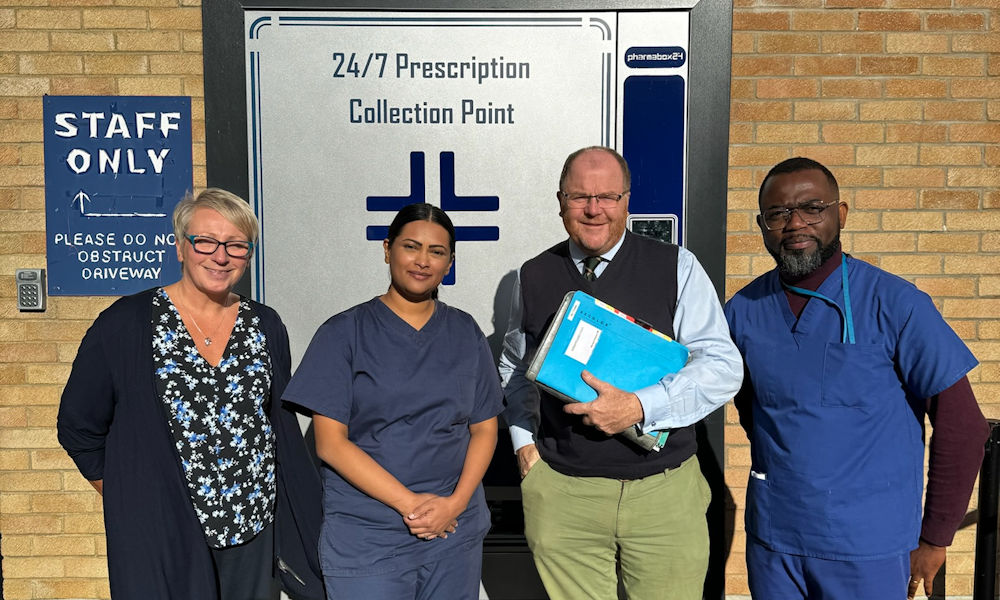
GP Surgeries and Pharmacies are under immense pressure – especially those in rural areas such as Mid Norfolk.
Staff at these vital local facilities work incredibly hard, as I saw on Friday when I visited Mattishall Surgery and Pharmacy. They are currently dealing with the knock-on effects of the pandemic backlog, meaning that people require GP care for longer whilst they wait for surgery, as well as national trends such as a growing and ageing population.
We must ensure that these dedicated staff, who work incredibly hard to ensure that we are all safe and well, receive the support they need – including ensuring that surgeries are properly compensated for the costs that come with serving a rural area, making sure that they are able to recruit staff (which is why I am pleased that the Government continues to offer bonuses of £20,000 to trainee GP’s who choose practices in areas struggling with recruitment), and seeing that they have proper facilities which enable them to care for their patients.
That is why, in conjunction with the practice leadership at Mattishall, I am exploring what action can be taken to try and bring about progress towards a new premises for the surgery and pharmacy – one that would better enable staff to provide the first-class services that patients need and deserve.
The team at the surgery continue to offer innovative solutions – whether that be a dispensing robot, or a 24 hour self-serve prescription collection point. That being said, it is clear from my visit that their building has reached the end of its useful life. A new, larger building would enable the practice to make sure that the team can get ahead of the curve on the health needs and population growth of the area for years to come – rather than trying to play catch-up as they have too often been made to do.
You can see more on my visit in the video below.
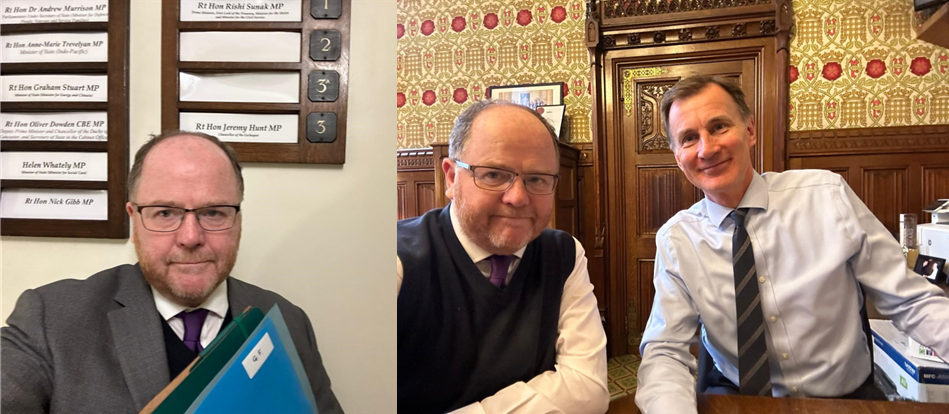
Rural counties like Norfolk have always suffered from disproportionately high energy and fuel costs compared to urban areas – a fact seldom reflected in the Whitehall funding formulas.
However, the sudden energy price inflation caused by Russia’s illegal war in Ukraine has led to a massive increase in fuel and energy costs over the last two years which has significantly added to those pressures and now means we are facing the perfect storm.
On Wednesday, I met with the Chancellor to discuss my letter to him and directly ask that he include in his Budget measures to help tackle the crippling impact of disproportionately high energy costs on rural communities.
(See my letter below)
I am determined to do all I can to be Mid Norfolk’s strongest voice on these key issues – and am working with other rural MPs to emphasise the importance of additional targeted assistance for rural communities.
To stay up to date with my campaign progress, please click here
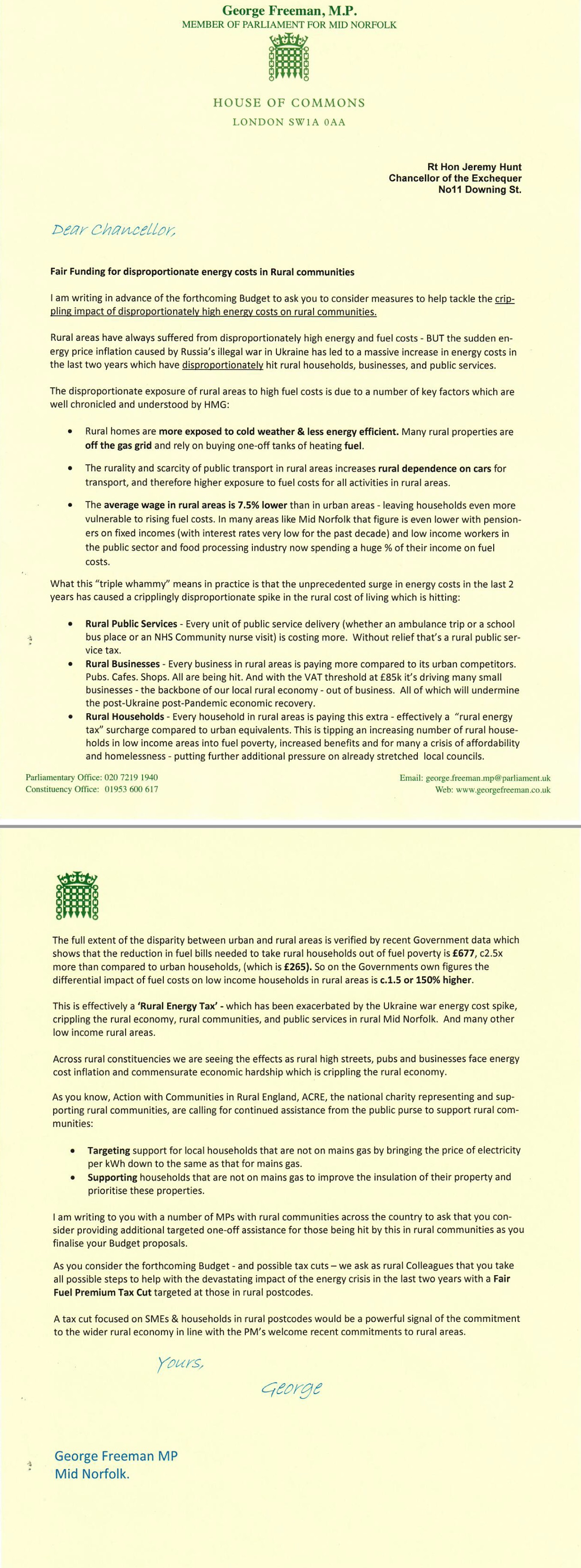
George Freeman raises concerns at the impact on horseracing if the affordability checks designed to tackle addictive online gambling go ahead as proposed and urges the Government to find an alternative that will both protect racing’s finances and take the opportunity for this country to lead in harnessing technology and smart regulation to tackle gambling addiction.
George Freeman (Mid Norfolk) (Con)
They say that all good things come to those who wait, so I hope the Minister will listen to my words and then reassure me that I have not waited in vain. I am grateful for the chance to speak in this debate. When more than 40 or 50 colleagues turn up to Westminster Hall—for those listening, and who are not aware—we clearly have a problem. Actually, I suggest we have two problems that the Minister present has the great honour of helping us to deal with.
The first is the very serious problem of the increasing number of people in this country who find themselves in the turmoil of addictive online gambling. That is a real problem. The second is the fragility of the finances of racing, a sport that we all love. We need to be clear about those two problems and not to conflate them too much, as has been done, and to work out how to deal with them both, because both problems are real.
I have no particular interest in racing, other than a long family history and connection. I have been to the races many times, both before my time here and as a Member of Parliament, and occasionally as a guest of the BHA, which supported the work I did to create the Bridge of Hope charity. I was, with pride, closely involved with the 2013 Offshore Gambling Bill, promoted by my right hon. Friend the Member for West Suffolk (Matt Hancock), who represents Newmarket, to bring offshore betting within the purview of the levy to give racing a serious boost. I do not have a racetrack in my constituency yet; I have waited for the Boundary Commission to put Fakenham in my patch for many years, but it has refused to do so. I enjoy the little tracks as much as the big—a point that my hon. Friend the Member for Waveney (Peter Aldous) has just made. It is a great pleasure to follow him. My brother trains in California, and I have spent many hours as an underpaid hot walker, walking his hots around the track in both California and, in rather cooler weather, at Woodbine in the winter. I am a happy and assiduous attendee at Fakenham races, one of the country’s great regional tracks
I think the House will be aware that I really stand this afternoon because of my own family experience. My father was a jump jockey who rode through the ’40s and ’50s. He rode for Sir Peter Cazalet and rode Her late Majesty the Queen Mother’s horses. In 1958, he won the grand national on Mr What and the King George on Lochroe. With my mother, he bred Specify, who went on to win the national in ’71. However, my father’s is a tragic story. After many head injuries, head injury-induced depression and psychosis, alcohol addiction, gambling and bankruptcy, his life—indeed, that of my family—collapsed in 1967. It is a familiar tale for many sporting heroes, but a story that, thanks to the great work of the racing industry, we do not see any more because we are better at looking after jockeys and better at detecting head injuries.
It is in that context that I want to make clear that I rise today because I take the unintended consequences very seriously—the damage of great sport when not properly regulated, and the damage of gambling and bankruptcy. I am not at all relaxed about those dangers. I hope it is, therefore, all the more powerful when I join colleagues who have spoken today in saying how seriously I worry that this well-intended measure, designed to tackle the curse of online gambling, is in danger of not solving that problem, but exacerbating another: the deeply fragile finances of a great sport that all Members present, across all parties, have expressed our love for.
I am fearful that we are in danger of making a mistake that, in 15 years in Parliament and 30 years of watching, I have seen all too often, which is the mistake of do-somethingery: “Something must be done. This is something—let’s do it.” It is using a sledgehammer to crack a nut, with the law of unintended consequences, punishing the innocent and doing very little to tackle the real problem, and seriously damaging the financial resilience of this great industry. I think it would be a huge mistake, and a great shame on us as a generation and on the Government who allowed it to happen. In that spirit, I am here to try to give the Minister some helpful tips on how we might find the right way through this.
I thank the petitioners who brought us here today, as well as the Racing Post and the British Horseracing Authority, which have done such good work to raise the issues. I will highlight three important pieces of data shared in the British Horseracing Authority brief. The first relates to the impact of these measures. More than 15,000 horserace bettors took part in the Right to Bet survey in the autumn. Of those, more than half said they will stop betting, or bet less, if new checks are introduced, while one in 10 bettors is already using a black market bookmaker. Some 40% are prepared to use the black market if clunky enforcement affordability checks are implemented, 90% oppose postcodes or job titles being used to determine their ability to bet, and 26% have already experienced an affordability check ahead of the passing of any legislation.
Secondly, the briefing makes clear the full impact of these reforms if introduced as they stand. There will potentially be a £50 million cost to this industry, which, as my hon. Friend the Member for Waveney has just made clear, is already struggling. That is not something that we should accept lightly.
Thirdly, the briefing points out that a £500 a year upper threshold for frictionless checks works out at a net spend of just £1.37 a day. Are we seriously intending to damage the viability of this great sport and this great industry in order to look busy in monitoring a £1.37 risk? This is a disproportionate measure and I fear that it will have major unintended consequences.
I will not repeat or rehearse the arguments that have been made very eloquently by many colleagues. I will just highlight the fact that there are many who are not able to speak here today, including many peers in the upper House, whom I will not name but who have taken a very strong interest in the issue, and my right hon. Friends the Members for Stratford-on-Avon (Nadhim Zahawi) and for Witham (Priti Patel), and my hon. Friend the Member for Hexham (Guy Opperman), who is a Minister. He is also a distinguished amateur jockey who would have spoken today had he been allowed to do so. Many people from across the House have not been able to speak in this debate but would have done so very forcefully.
I will make one or two points that perhaps have not been made as fully as they might have been. First, as has been said, racing is a vital mainstay of the decentralised rural economy all round this country, and it is absolutely key to the levelling-up mission that the Government have set out. Yes, it is the sport of kings, as others have said, but it is also the sport of stable lads and ladesses, and the sport of small businesses all around the country. It is the sport that provides the pyramid at the bottom of which are the point to point races, the pony clubs and all the grassroots equestrian activity that we love and rely on.
From Yarmouth to Chepstow, from Wincanton to Kelso and from Cartmel to Catterick, many tracks are integral to their local economy. Horseracing touches on and is instrumental in 60 marginal seats, which is not a small number in an election year, creates 80,000 jobs directly and 100,000 indirectly, and 8,000 small and medium-sized enterprises are involved with it. This is not a fringe activity; it is a very key activity at the heart of our decentralised economy.
I will just make another point. An earlier speaker suggested that we do not need betting to support the boat race or one-off events. Horses are not machines and we cannot have an industry based on one race a year. The reason we can have the Derby is that we have all the other races that build up to it, and it is the same with the grand national. Those two races are the pinnacles of great pyramids of activity that start at small, windy tracks all around the country. Also, horses cannot just be parked for 364 days a year and then asked to run; the training and the conditioning of horses requires activity all through the year.
Wera Hobhouse
Throughout this debate, we have not really mentioned these beautiful creatures, the joy we get from watching them race, or all those people who work with, train and look after them. That is really important to all of us who have spoken today.
George Freeman
I am grateful to the hon. Lady, who makes a good point. They are beautiful and what a joy it is to watch them exercising, whether in Malton in Yorkshire or wherever else around the country. The sight of horses exercising in preparation for racing is part of the rural economy.
Secondly, I want to make the point that horseracing, as an activity and an industry, is a jewel in the crown of our global soft power. The truth is that, having grown up in Newmarket as a child, I have watched as that town and its horseracing have become very reliant—over-reliant, I would suggest—on a few very wealthy families. Those families have done an amazing service to our sport, but we have to make sure that we are not reliant on a very small number of individuals to maintain the viability of an entire industry. That point puts this debate in a wider context.
Crucially, I also want to highlight that there is a very serious problem in our society of addiction to gambling, particularly online gambling, and there is a growing body of evidence—I say this as the former Minister for Life Sciences and as somebody who has had a career in medical research—that the causes of such addictive behaviour and cycles of addiction are not simply based on repeat activity. They are a symptom of much deeper underlying causes, which are often genetic and nearly always neurological. There are a whole series of conditions that drive that underlying cycle of addictive behaviour. It is not that someone has a bet on a horse, then a second bet and it is entirely addictive. Indeed, in my own experience, betting on horses is quite the opposite; I have very seldom made much money doing it and I very seldom carry on doing it with that in mind. No, that is not what drives the addictive behaviour; it is underpinning neuroscience and wider conditions. As a society we really need to take those factors very seriously.
Matt Hancock
Is there not the more specific distinction, which the hon. Gentleman almost drew out, that the placing of a bet and then waiting many minutes as a minimum for a result is neurologically distinct from a bet that gives an immediate hit? Where the repeat bet would be based on the physiological immediacy of the previous result, horseracing breaks that and therefore has a different neurological impact in relation to addiction. Would it therefore not be right in law and in policy to completely separate the proposals for online games of chance from the wonderful sport of horseracing? It would be easy to do in law—let’s just split the two.
George Freeman
The right hon. Gentleman anticipates the logic of the argument I was building towards—he is exactly right. That is why if we are seriously thinking of tackling this curse of addictive online gambling, surely we should be looking at a whole range of other behaviours and products. The proposal seems to be a disproportionate way of tackling a real problem, if indeed that is what it is. Others have mentioned the logical consistency of extending these checks on alcohol, tobacco, car hire purchases and—dare I say it—mortgages, and all sorts of things that we might say people cannot afford. I worry that this could be the thin end of a very big wedge in which the state decides that it is its job not to regulate properly, but to start asking whether people can afford to do something. That is an Orwellian dystopia that I do not want to live in.
The truth is we have to think properly about the sustainable resilience of racing. I absolutely echo the comments of my hon. Friend the Member for Tewkesbury (Mr Robertson): prize money is falling fast, costs have risen fast and are stubbornly high, and competition is eating our lunch. If we look to Irish and French racing, we see that we are haemorrhaging from a serious industry. This proposal would not make a small reform to a healthy industry—the industry is struggling and it needs our help, but I am worried that the law of unintended consequences will make the situation worse.
I want to make a point about technology. It has often been asserted that we do not have the technology to do these checks properly. That is right at the moment, but would it not be an amazing thing if we decided to use technology properly—we are already an AI powerhouse—to start to analyse addictive behaviour and look at the trades on digital betting that indicate such behaviour? Over 70 markers of harmful gambling have been identified in studies, 16 of which really drive this activity. I suggest there might be an opportunity for us to use technology better to tackle those behaviours online that drive the problem we are trying to solve.
I echo the comments of the right hon. Member for West Suffolk on track racing, which I would go so far as to say is one of the best ways to introduce people to responsible gambling. I remember taking my two children to the 2000 Guineas and giving them £5 each, and they decided to put it together on an each-way bet. It was a smart move; they are clever children. Even more clever, my son decided to take my daughter’s advice, because she knows about horses, and he looked at the odds, because he knows about numbers, and they put £5 each way on Galileo Gold, who stormed to victory. They learned a lot that day about gambling. They saw people who had drunk too much and who were losing too much. They didn’t. I took the money and gave it to them. They discovered a lot, and on-track gambling is a fabulous way of getting people to realise that most of the decisions we take in life are a gamble one way or another, and it is how we deal with them that really matters.
I am not here in any way for the health of the gambling industry. I am interested in the health of UK racing and the real identification of the at-risk addiction that we see cursing so much of our society, in particular those games of chance that have driven such addiction. I simply say to the Minister that I know he has a difficult job on his hands. I have sat at that Dispatch Box with a packed Westminster Hall calling for reform. The Prime Minister, in North Yorkshire, understands the importance of the industry. The Secretary of State’s constituency is next to Newmarket—in fact, she has the breeder of Galileo Gold in her constituency—and understands it. It is not too late to change tact and come back with a serious package of measures designed for the twin problems of the sustainability of racing’s finances and the genuine opportunity for this country to lead in harnessing technology and smart regulation for the tackling of gambling addiction. If not, I urge the Minister to look seriously at the net loss provisions, which are too low. When an industry warns that something will cost it £50 million, we have a duty to listen.
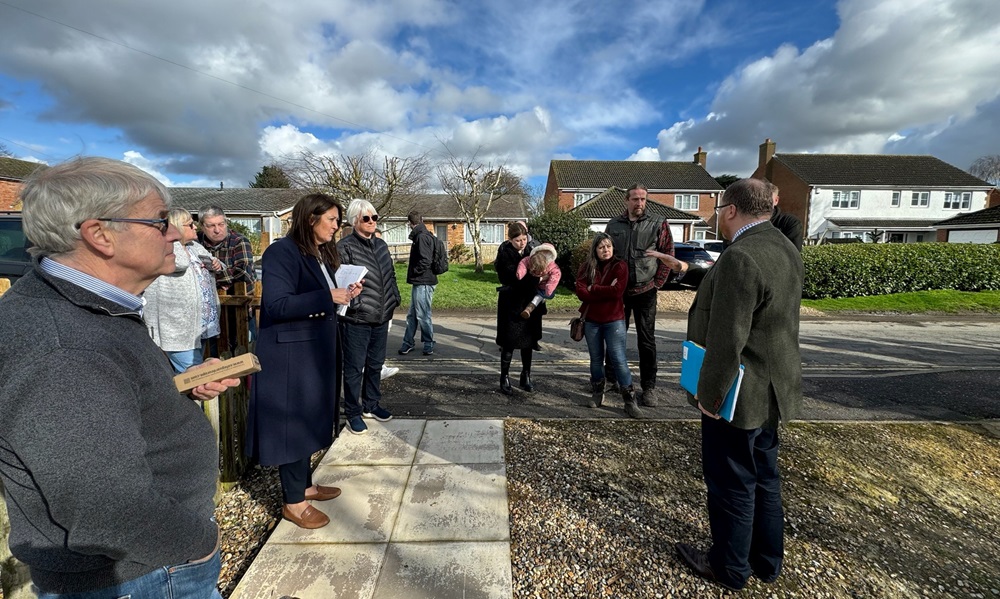
The latest serious flooding in Attleborough is a further reminder of the importance of properly tackling the problems in the town.
That’s why, as part of my ongoing work to hold stakeholders to account and help bring about the solutions my constituents desperately need, I was back in Attleborough on Friday to meet with local councillors, as well as representatives of both Norfolk County Council’s Flood and Water Management team and Anglian Water.
Together, we visited the New North Road residents flooded last week – before heading over to the Mill Lane culvert to receive an update there too.
I was delighted to hear therefore that:
- The Natural Flood Management Fund bid I supported Norfolk County Council with has been successful – securing £150,000 towards work to deliver a proper water storage and flooding mitigation scheme upstream of the Mill Lane culvert.
- Anglian Water have listened to NCC and I and have appointed a Mid Norfolk Flooding Liaison, who was present at Friday’s meeting and who will be working closely with our communities moving forward.
Two very positive steps.
However, there is much more to do. No one should have to live in fear each time it rains. Stakeholders have got to properly grip these problems and address them.
That’s why I remain committed to driving forward my Flooding campaign – particularly through the Flooding Bill I am bringing to the House and through the establishment of a Norfolk Flooding Summit.
Full details of my ‘Flooding and the Mid Norfolk Flood Partnership’ campaign can be found here
To see the EDP article on my visit, please click here
For more information on my work on the Attleborough Flooding specifically, please scroll below.
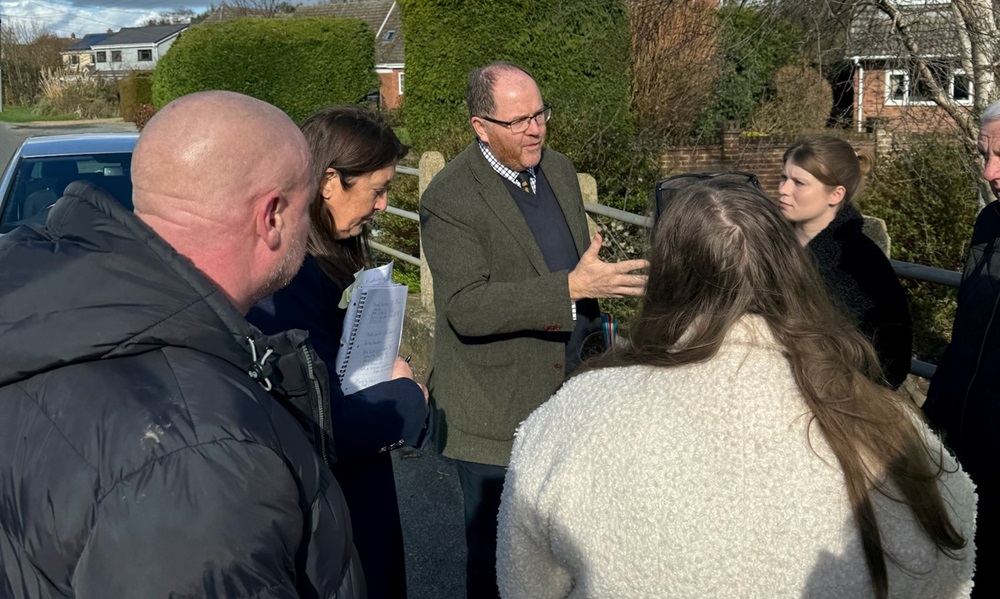
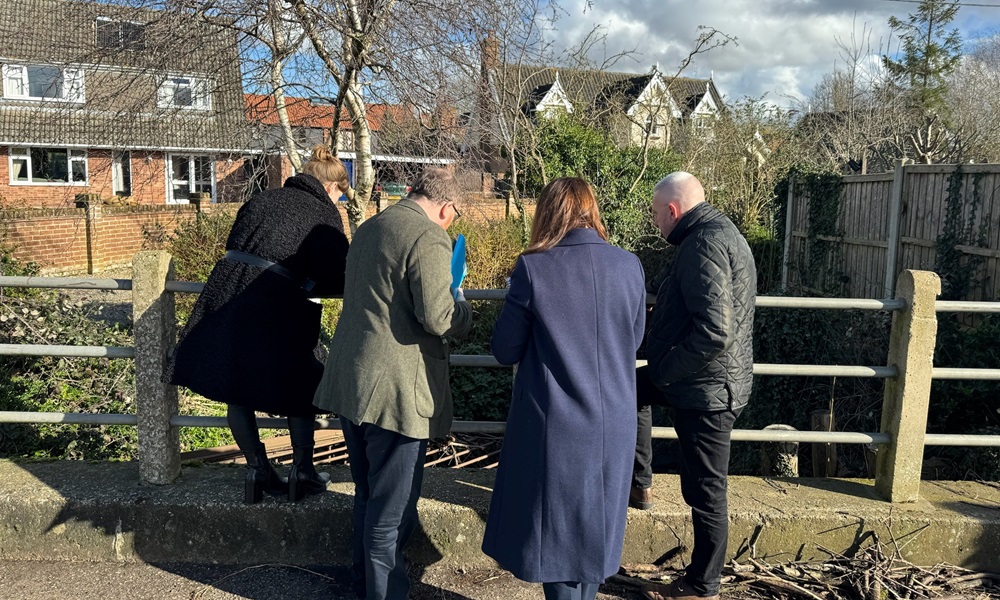
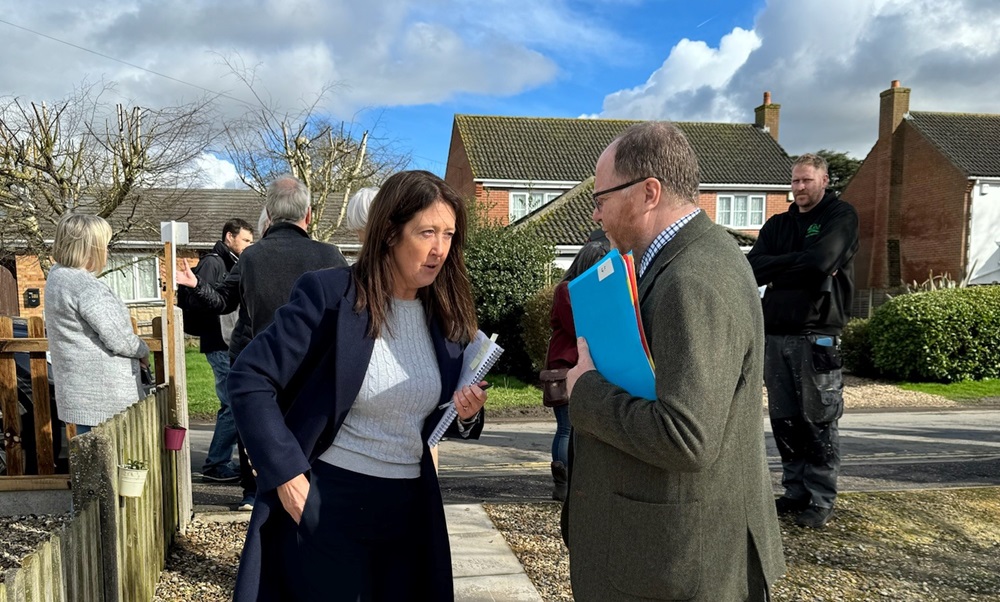
UPDATE 22 February 2024
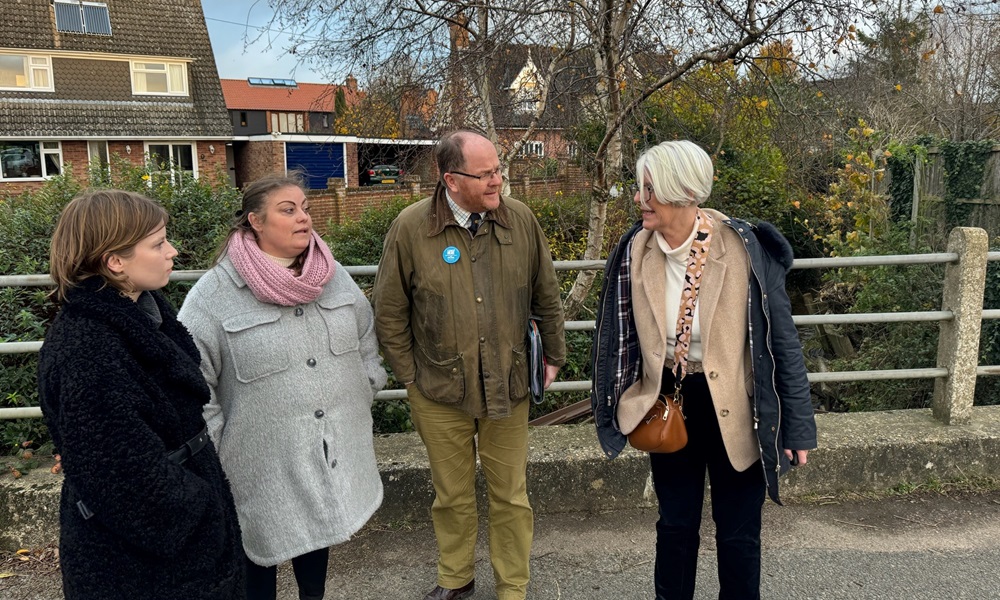
More terrible flooding in Attleborough. More appalling trauma for all those households affected.
Thank you for the Norfolk Fire and Rescue Service and Breckland Council for their rapid response.
Am in urgent contact this morning with Breckland and the key local agencies to get a proper plan in place for the next few days with more heavy rain forecast.
Rearranging tomorrow’s constituency plans to get to Attleborough to see the scale of these floods for myself and thank local volunteers.
This has to stop. That’s why I’m pushing on with:
- Mid Norfolk Flood Partnership
- My Flooding Bill to change the planning and liability laws
- The Norfolk Flood Summit I’m convening to get all the c.36 agencies responsible together to stop the buck passing and sort it.
More on my work to tackle the Mill Lane culvert and watercourse flooding issues here.
More on my wider flooding campaign work here.

UPDATE 21 February 2024
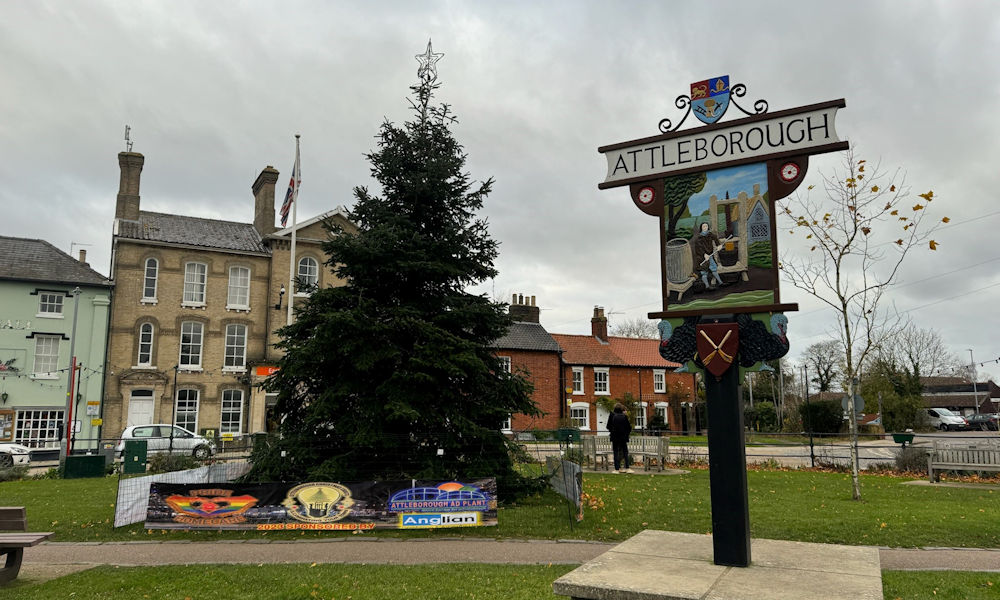
With Storm Babet still fresh in the memories of the 100+ Attleborough households and businesses flooded back in October, I am very aware of the ongoing pressure and stress heavy rainfall is putting upon many of my constituents in the town.
That’s why, since the multi-agency meeting I convened last month to strengthen coordination between stakeholders at all levels, I have continued to take a close interest with local councillors.
I recently joined a stakeholder conversation to discuss the Mill Lane culvert and receive an update on progress, and can confirm that:
- The design for the new Mill Lane culvert trash screen has now been approved and costed – with Norfolk County Council, Breckland Council and Anglian Water all reaffirming their commitment to share those costs and proceed as quickly as possible.
(As highlighted previously however, the new trash screen may not be in place for several months – with the screen itself taking up to a month to construct and then stakeholders having to wait until the water level has dropped sufficiently and the watercourse can be dewatered for the construction of the screen’s concrete base).
- NCC have had the culverts at Mill Lane and Briar Gardens inspected again. Deposits of gravel and silt have been found in parts and NCC are pressing ahead with arrangements to have these cleared – with the necessary contractors set to carry out works in early March.
In addition to this, I can share news that:
- I continue to support NCC’s Flood and Water Management team and local councillors as they engage with landowners upstream to explore potential flood prevention and mitigation measures on their land.
- NCC sent riparian ownership reminder letters to landowners and homeowners along the problem watercourse in mid-January to remind them of their riparian responsibilities and make clear what they must not throw into the stream.
- NCC are working with the Internal Drainage Board to lobby Network Rail to inspect and, if necessary, clear the culvert they are responsible for downstream under the A11.
- Stakeholders continue to look at what more can be done to protect the most at risk properties this winter.
Once again, I’ve reiterated the importance of looking at the longer term issue of responsibility and maintenance of the culverts and watercourses – and I will be involved in the next Mill Lane culvert stakeholder meeting next week as these vital conversations continue.
I am also arranging the next wider multi-agency meeting on the Attleborough flooding too.
Rest assured, I will continue to work with local councillors and residents to hold the key stakeholders to account on this to drive forward the solutions Attleborough needs to see.
To learn more on the Attleborough Flooding campaign to date, please scroll down and read the updates below.
To learn more about my wider ‘Flooding and the Mid Norfolk Flood Partnership’ campaign, please click the link here.
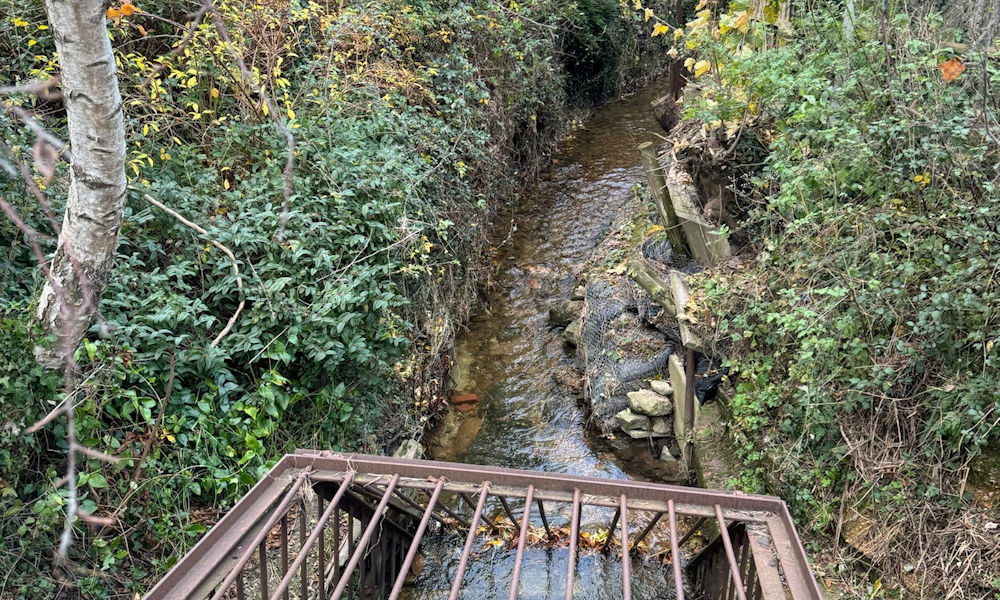
UPDATE 17 January 2024
Storm Babet flooded over 100 homes in Attleborough back in October and local residents (for some of which the recent flooding was the fourth time they had been affected) are rightly furious.
That’s why, as part of my ongoing Mid Norfolk Flood Partnership and Flooding Campaign work, I continue to take an active role in supporting those affected and holding the key stakeholders to account – both here in Mid Norfolk, but also in Westminster.
While a number of short and medium term measures have already been carried out or are underway (see here), the incredibly high water levels at the Mill Lane culvert and watercourse at the start of the new year, and the serious risk residents are having to take in order to protect their homes, shows more must be done.

Last week, I convened a multi-agency meeting with representatives from Norfolk County Council, the Norfolk Strategic Flooding Alliance, Breckland Council, the local Internal Drainage Board, Anglian Water, Natural England, the Environment Agency – as well as local Town, Parish, District and County Councillors and representatives of local landowners upstream of the Mill Lane culvert and watercourse – to emphasise again the importance of tackling these serious issues and explore in greater depth the short, medium and long term work required to significantly reduce future flood risk.
I drew particular attention to those homeowners most at risk of flooding on Mill Lane – many of whom feel helpless and desperate, believing they have no choice but to seriously risk their own safety to try and keep the trash screen across the Mill Lane culvert clear each time it rains.
The key discussion points from the meeting were:
- A shared acknowledgement that residents are seriously risking their own safety to keep the Mill Lane culvert trash screen clear of debris – and of the fact that conditions and circumstances at the culvert can change rapidly during periods of heavy rain.
- Agreement that the existing Mill Lane culvert trash screen should not be removed until the new replacement has been installed (work currently underway – see here) – as the culvert has a 90 degree bend that, were it to become blocked, would be extremely difficult and costly to clear – and significantly worsen the current flood risk to the area.
- NCC Flood and Water Management officials met with Anglian Water contractors on-site (the day prior the meeting) to verify the new trash screen designs ahead of pricing the work – with a multi-agency agreement already in place to fund it.
- The installation of the new trash screen will likely not be possible prior to the summer. This is because the watercourse will need to be de-watered so that a new concrete base can be constructed and the trash screen fitted.
- Further measures are therefore required in the short term to try and reduce flood risk along the watercourse and at the Mill Lane culvert.
- NCC are going to work with local landowners and other stakeholders to explore installing an additional, temporary screen somewhere upstream that can catch debris and prevent it becoming a problem in Attleborough itself.
- The Mill Lane culvert, and others along the watercourse, cannot be expanded – nor the watercourse itself deepened or widened – due to the amount of development and road access around and across it. The enormous cost and disruption, and lack of space, make it impossible.
- Given concerns over residents and local councillors risking their safety by entering the watercourse to keep the Mill Lane culvert trash screen clear, a suggestion was made to appoint a jointly funded contractor to be on 24/7 call out to clear debris and blockages at the culvert trash screen when required. This suggestion was dismissed on the basis that no organisation would allow their staff to entering the water in storm flow conditions (when they would be most needed) – especially if Norfolk Fire and Rescue themselves have said the risk would be too great for even their own teams.
- A suggestion was made to explore how the watercourse may, long term, be diverted to another course away from the town. Flooding Officers explained this would probably not be possible given local topography.
- It is therefore not possible to immediately remove all flood risk. Instead, agencies must work with the properties most at risk to do as much as possible to improve their flood resilience.
- NCC have also submitted a bid to the Natural Flood Management Fund, supported by myself and others, and I am working with them and local landowners upstream to explore how we might deliver a Flood Mitigation and Water Storage Scheme that could drastically reduce the long term flood risk to homeowners and businesses in Attleborough (see more here)
- Everyone affected in the area by flooding in October must formally report their cases via the Norfolk County Council website to enable the Flood Investigations underway to be as accurate as possible – which in turn will strengthen the hand of local stakeholders to lobby for additional funding and support.
- NCC are to look at monitoring water volumes and storm flows on the watercourse – again to strengthen their hand when lobbying for resources.
- Local councillors asked what more could be done to improve safety for those homeowners currently taking risks to keep the Mill Lane culvert trash screen clear. It was asked if lighting and cameras could be installed.
- I reiterated my ongoing support for all the efforts to tackle these flooding issues – and highlighted my efforts in Westminster to bring about the national reform needed also (see more here)
As is clear, this isn’t an easy fix – with multiple challenges faced. However, I am determined to all I can to support the community.
The key focusses/timescales moving forward are:
Short Term (Now-next few weeks)
- Doing as much as possible to improve the flood resilience of the most at risk properties
- Explore what more can be done to improve safety for those putting themselves at risk to keep the Mill Lane culvert trash screen clear
- Find a suitable location for an additional, temporary screen upstream to collect debris – and explore additional short term measures upstream that can reduce flood risk
Medium Term (Summer)
- Replacement of the existing trash screen with a new one that is designed specifically for the challenges being faced.
- Continue to explore what measures can be introduced to reduce flood risk.
Longer Term
- Deliver a Flood Mitigation and Water Storage Scheme upstream that can significantly reduce flood risk
- Deliver legislative changes and reform in the House to better empower local communities so that they can protect themselves from flooding, while also holding developers to account when new housing exacerbates local problems.
Rest assured, I will keep working tirelessly on this issue.
To stay up to date, please visit my flooding campaign page here.
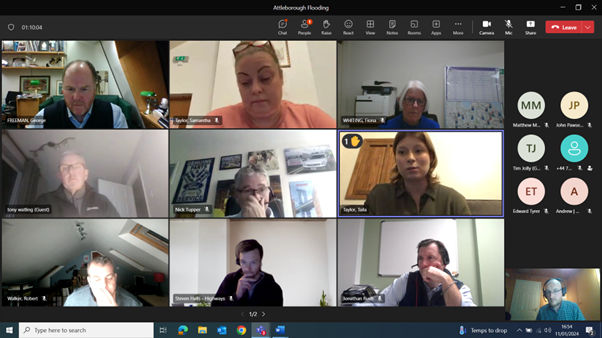
UPDATE 4 December 2023
Over 100 homes in Attleborough were flooded in Storm Babet at the end of October.
We cannot allow this to happen again. Local residents (for some of which the recent flooding was the fourth time they had been impacted) are rightly furious.
That’s why earlier today, as part of my ongoing campaign (and having recently reconvened the Mid Norfolk Flood Partnership that I established back in early 2021 – see here), I met with Norfolk County Council’s Flood and Water Management team, the Norfolk Strategic Flooding Alliance and representatives for some of the landowners upstream of the Mill Lane culvert and watercourse.
It’s clear that that we need a proper long term strategic plan that addresses problem watercourse pinch points AND looks to better control the flow of water downstream during heavy rainfall events. While some positive progress is already being made at the Mill Lane culvert itself (as explained in my previous Attleborough Flooding campaign update here), today’s call focused on what can be done further upstream – and I am committed to actively supporting NCC/the NSFA and partners as they work with landowners and other agencies to explore what flood mitigation and water storage scheme measures might work best for Attleborough.
To see all of my recent work supporting Attleborough residents, please click here or see below.
For full details on all of my flooding campaign work, please visit my website here.
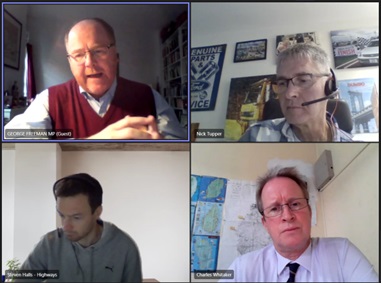
UDPATE 29 November 2023
Attleborough was one of several Mid Norfolk communities badly impacted by recent flooding.
That’s why, as part of my ongoing campaign, I visited Mill Lane with Cllrs Samantha and Taila Taylor this past Friday to see the problem culvert/watercourse first hand and meet with some of the worst affected residents.
Please see my video above.
Local residents (for some of which the recent flooding was the fourth time they had been impacted) are rightly furious – and I continue to hold the key stakeholders to account to ensure everything that can be done is indeed being done to provide affected residents with the support they need, as well as to put in place a short, medium and long term plan that looks to try and prevent future such flooding again in future.
Some positive progress is already being made (as explained in my previous Attleborough Flooding campaign update here), but there still remains much more to do.
That’s why, as highlighted in my recent update here, I recently reconvened the Mid Norfolk Flood Partnership to give our communities the strongest possible voice on these issues. Attleborough had strong representation on that call and I am determined to do everything I can, alongside local councillors, to ensure residents like those on Mill Lane and surrounding streets are heard.
I will be involved in more meetings in the coming days and am also writing to ministers and officials in Westminster to re-emphasise again the need to put greater emphasis on flooding and drainage matters in the planning process – including putting increased responsibility on developers who’s developments subsequently flood and/or impact the existing community.
To stay up to date with all my work on these issues, please visit my Flooding campaign page here.
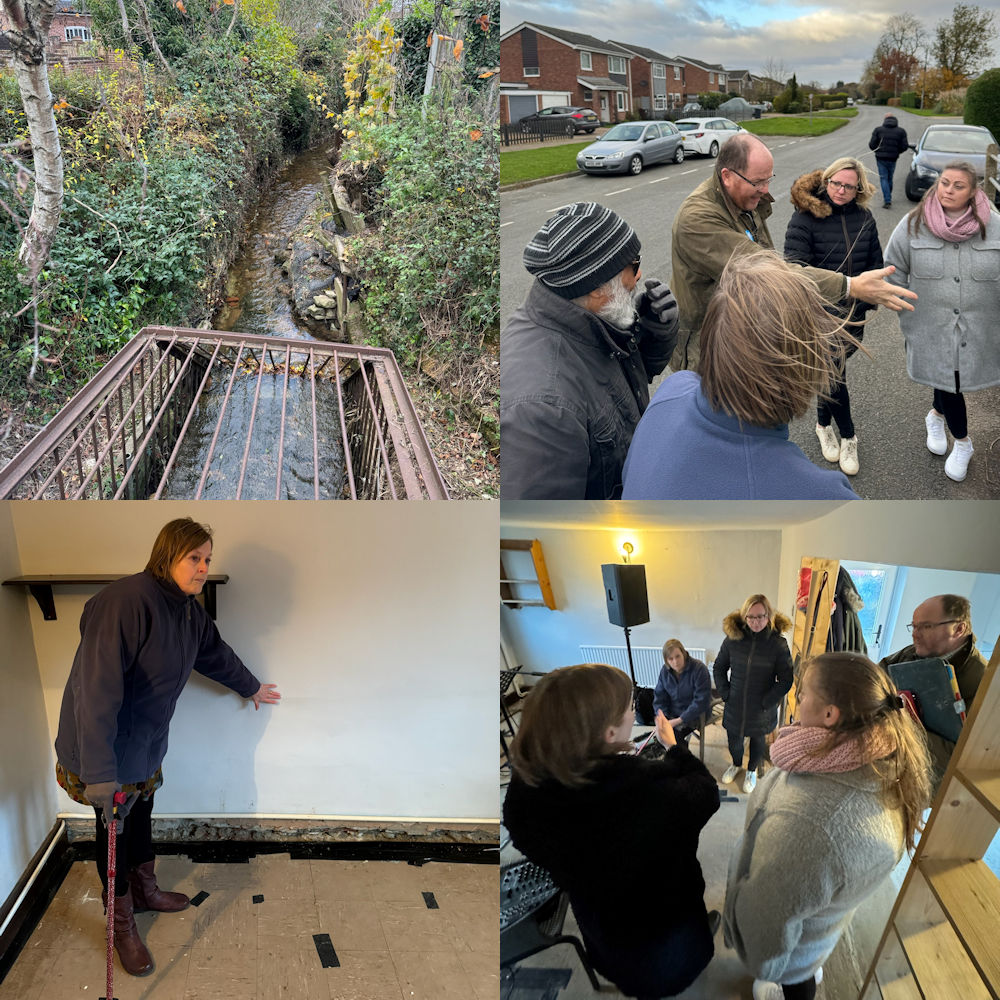
UPDATE 3 November 2023
Further to my webstory update last week (see here), I can now provide more information on the work being done by multiple parties to address the terrible flooding that has recently affected many households and businesses in Attleborough.
On Monday, the Town Council and local district and county councillors held a public meeting in the town for local residents to speak with key stakeholders. The event was well attended and I am pleased to report that stakeholders have been following up on a number of the points and concerns raised – with additional site visits undertaken to the culvert and watercourse on Mill Lane (as well as the culvert in Briar Gardens). Meetings with developers to assess drainage on their building sites have also taken place and I am aware that a series of additional measures, along with further clearing of drains and ditches, are already being implemented – with anecdotal reports of additional blockages being addressed. I will continue to monitor progress closely.
Further to the emergency meeting I held last week (see here), an urgent meeting took place on Tuesday between Norfolk County Council, the Norfolk Strategic Flooding Alliance, Breckland Council and Anglian Water to discuss in greater depth the specific issues that caused flooding at the Mill Lane culvert and connected watercourse.
As many are aware, the culvert and watercourse were divested to riparian ownership many years ago. While that question of who will take on the long term ownership remains (and rest assured that I continue to push very hard on that and have challenged all stakeholders to work collaboratively to develop a proper strategic plan and solution for the issue), I welcome the collective recognition that something needs to be done as soon as possible, with agreement that the inadequate and unsafe trash screen that caused many of the recent problemsneeds to be replaced.
On a without prejudice basis (of who will assume long term responsibility for the culvert and watercourse) and as a gesture of goodwill, Anglian Water have agreed to have their contractors assess the trash screen and culvert and work up the design for a much safer, more effective replacement. All stakeholders will then jointly fund the improved screen and Anglian Water will install it.
In the meantime (and again on a without prejudice basis and as a gesture of goodwill), Anglian Water will endeavour to send staff every couple of weeks to keep the existing trash screen clear. (Breckland, NCC and Anglian Water are also discussing a longer term plan for removing any debris collected from the culvert and watercourse)
I would like to reiterate however that I will keep on the critical question of who will assume the long term responsibility and ownership of the culvert and watercourse – and am already liaising with the key stakeholders on the date for a follow-up meeting to discuss that matter further.
NCC have also confirmed that the gulleys around Mill Lane have been cleared (with additional review taking place of gulleys on surrounding streets) and I understand that an assessment is taking place as to whether the trash screen at the Briar Gardens culvert should be removed.
A full flood investigation is now being led by NCC in line with their statutory processes. Although their Flood and Water Management team had already been working on proposals to better mitigate flooding in this area (as a result of the December 23rd-24th 2020 flooding event), there is recognition that their Flood Plan for the area, and its associated work, now needs accelerating and upscaling. I have committed to supporting NCC as they seek to secure the additional funding required to implement any recommended measures, as well as to engage with key local landowners.
I am also in the process of reconvening the Mid Norfolk Flood Partnership I previously established – and will ensure Attleborough is represented in those vital conversations.
Rest assured, I am determined to do everything I can to speak up for those affected in Attleborough, as well as those across Mid Norfolk.

UPDATE 25 October 2023
Storm Babet has reminded us again why we must continue to take flooding seriously.
Attleborough was one of several Mid Norfolk communities badly impacted, with severe flooding on Mill Lane, Norwich Road, Ferguson Way and other nearby streets. For some, it was the fourth time they had been flooded in 30 years – and the second time in just under three years. I appreciate, and share, the immense anger and frustration felt by those that have been forced to leave their homes as a result of the damage suffered this past weekend.
That’s why I held an emergency meeting today with Norfolk County Council and their Norfolk Strategic Flooding Alliance, Anglian Water and Breckland District Council to get to the bottom of what is causing the flooding at the watercourse and culvert on Mill Lane, as well as ensure that those with statutory flooding responsibilities come together and develop an urgent action plan.
While NCC began working on proposals to address flooding at this location in light of the December 2020 flooding, Storm Babet has brought into sharper focus the need to upscale and accelerate those proposals, and address other issues such as questions around which authority is responsible for the culvert and watercourse and therefore who should be maintaining them.
I had made clear that there needs to be:
- A proper plan for ensuring affected residents (and the wider community) are protected from further flooding this winter.
- An acceleration and upscaling of efforts to put in place a long term solution.
- A proper plan for who is going to be responsible for this culvert and watercourse in due course.
- Agreement on who is going to keep the culvert and watercourse clear NOW – while the longer term plan is being developed and implemented.
I am in close contact with local district councillors and a number of those worst affected by the flooding and am determined to help them work with key stakeholders to develop a solution.
We must see action. This must not be allowed to happen again. And residents should not be risking their own safety to try and keep this culvert clear during storms and heavy rainfall.
More widely, I will be reconvening the Mid Norfolk Flood Partnership I established as a result of the Winter 2020/21 flooding to help support those affected by Storm Babet and ensure our communities have the strongest possible voice heading into this autumn/winter.
Rest assured, I will continue to support councillors and residents in the days, weeks and months ahead.
To see my Flooding Update earlier this week, please click here
To find out more about my historic campaign work on flooding, please visit my campaign page here
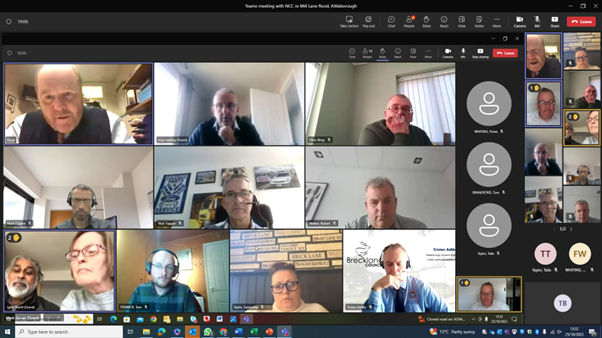
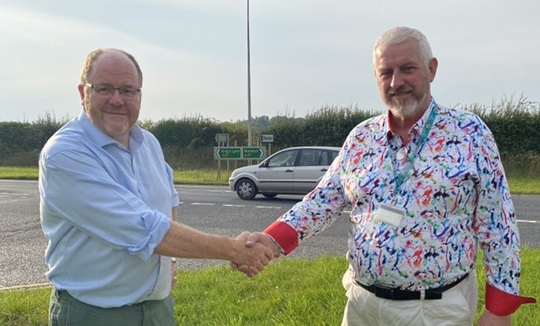
The A47 Necton/Dunham junction has long been a source of major concern for those that have cause to use it.
That’s why I was delighted when National Highways finally began vital safety improvements in the autumn and gave us their commitment to reduce the speed limit through the junction from 50mph-40mph – having listened to the concerns of local councillors, the community and myself.
I am pleased to report that the new 40mph is now in operation – with new, updated signs and road markings.
Brilliant news.
This is a big step – but more can and must be done to improve safety at this location and all along the A47.
I will continue to use opportunities like my meeting with National Highways last week (see more here) to lobby hard and speak up on behalf of my Mid Norfolk communities.
To learn more about my work on the Necton Junction Safety Improvements campaign, please see below.
To find out more about my wider ‘Making Our Roads Fit For The 21st Century’ campaign, please click here
UPDATE - 11 October 2023
Further to my webstory last month (see below – dated 18th September 2023), I am delighted to share news from National Highways that the speed limit at the dangerous A47 Necton/Dunham junction will be permanently reduced from 50mph to 40mph as part of the ongoing construction works – subject to the completion of statutory processes.
Fantastic news!
Having helped secure the safety improvements currently underway, this latest progress is very positive indeed and a further boost for local road safety.
Rest assured however, my work to improve road safety across Mid Norfolk continues. I will continue to lobby National Highways and others on blackspots such as those in Guist and at the Draytonhall Lane A47 Junction.
To see more about my ongoing work to improve road safety and infrastructure in Norfolk, please visit my campaign page here
To see more about my historic work with Necton Parish Council and Cllrs Nigel Wilkin and Mark Kiddle-Morris on the A47 Necton/Dunham Junction, please see my previous webstory below.
UPDATE - 18 September 2023
The A47 Necton/Dunham junction has long been a source of major concern for those that have cause to use it.
That’s why I was delighted to help secure a commitment from National Highways for improvement works at this dangerous location (having long campaigned with local district, county and parish councillors to that end), and why I am thrilled to now have confirmation that the works will finally get underway next Monday (25th September 2023).
Another pledge successfully delivered!
The £2.5 million improvement project is forecast to take place over five months, with most of the work taking place on weeknights between 8pm-6am – when traffic flows are typically lighter. Both sides of the main A47 Necton/Dunham junction (at Tuns Road and Dunham Road) are set to be widened, with improved drainage and road markings also being put in place. As a result, it should be much safer to access and depart each side of the junction – with visibility significantly improved too.
Having pushed hard for safety improvements at this key junction, these works are a significant step forward. There is still more to do however as I work with the community to push for a permanent speed limit reduction from 50mph to 40mph and support further conversations about additional safety improvements that can be made at this location.
It was a pleasure to hold another site visit with Cllr Nigel Wilkin recently, at which we filmed a short video to update local constituents on the works that are about to commence. Please see below.
Rest assured, I will continue to work hard for further A47 safety improvements (including the also horrendous Draytonhall Lane Junction at Scarning), as well as towards the longer term aim of full A47 dualling.
To see more about my campaign to improve the A47 Necton/Dunham junction, please click here
To find about my wider campaign to improve Norfolk’s roads, please click here.
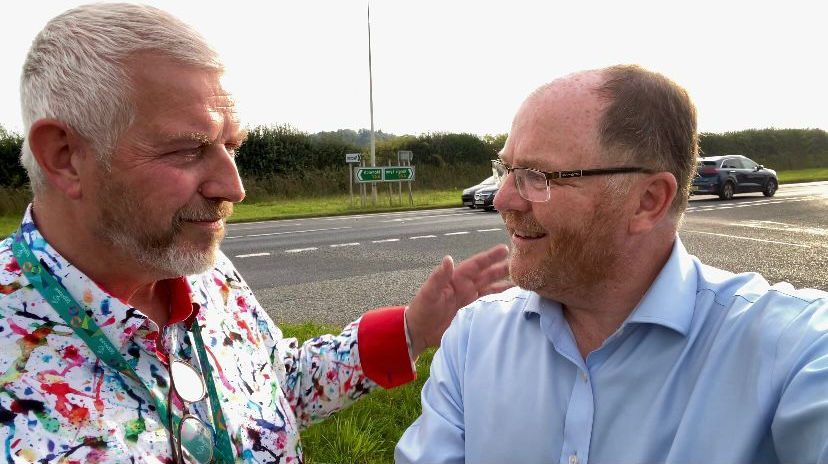
For 30 years, Norfolk has campaigned for A47 dualling. I, myself, have been on the case for 15 years, working with fellow Norfolk MPs, the A47 Alliance and the EDP – and was delighted to get the then Prime Minister to Mid Norfolk back in 2014 to agree the next phase of A47 improvements.
So, why has it then taken over 10 years to deliver these vital works?
Because Dr Andrew Boswell and a small group of eco-campaigners keep holding up these crucial projects through endless legal wranglings – while we are forced to suffer the terrible consequences of wholly inadequate safety and deadly accidents, as well as face regular flooding disruption and sitting in pollution caused by constant congestion.
And who is paying for this? We are. While Dr Boswell crowdfunds his legal costs and the taxpayer is left to foot the much more substantial part of the bill.
Enough is enough. This has to stop.
Of course, we cannot go on covering our country in commuter housing estates and continuing to build new roads anywhere. However, the A47 has been a vital, blocked artery across our county for decades – lethal in so many places and stifling Norfolk’s economic potential.
There is nothing “green” about the flooding, pollution, congestion and deadly accidents that the A47 in its current form entails.
Dualling will save lives. Dr Boswell’s constant blocking of these projects will cost them.
I urge Dr Boswell and his fellow eco-campaigners to stop holding Norfolk to ransom and instead allow Norfolk to get on and deliver these crucial improvements.
To read more on my work on this issue, please visit my ‘Making Our Roads Fit For the 21st Century’ campaign page here

Having finally secured the A47 dualling by bringing the then Prime Minister to Honingham back in 2014, it’s very frustrating that Mr. Boswell’s repeated legal objections to block the works have caused local people to suffer more accidents, delays, congestion and pollution. There’s nothing “green” about traffic jams.
It’s great news that the High Court have rejected his case and I hope very much this isn’t now allowed to be escalated again to the Supreme Court.
We need to get on and dual the A47 for the sake of the hundreds of thousands who rely on it.
To learn more about my work regarding the A47, as well as my wider ‘Making Our Roads Fit For The 21st Century’ campaign, please visit my campaign page here.

More terrible flooding in Attleborough. More appalling trauma for all those households affected.
Thank you for the Norfolk Fire and Rescue Service and Breckland Council for their rapid response.
Am in urgent contact this morning with Breckland and the key local agencies to get a proper plan in place for the next few days with more heavy rain forecast.
Rearranging tomorrow’s constituency plans to get to Attleborough to see the scale of these floods for myself and thank local volunteers.
This has to stop. That’s why I’m pushing on with:
- Mid Norfolk Flood Partnership
- My Flooding Bill to change the planning and liability laws
- The Norfolk Flood Summit I’m convening to get all the c.36 agencies responsible together to stop the buck passing and sort it.
More on my work to tackle the Mill Lane culvert and watercourse flooding issues here.
More on my wider flooding campaign work here.

Every year 16,000 people are diagnosed with brain cancer.
That’s 2 people per hour.
New technology is opening up new treatments.
Patients & their charities are desperate to support research medicine.
That’s why, during my time as Minister for Life Sciences at the DHSC, Jeremy Hunt, James O’Shaughnessy & I secured £40m for brain cancer research via the NIHR.
But it’s very concerning to hear it’s been held up by slow bureaucratic processes — when patients are desperate.
Having worked to support Mid Norfolk cancer patients throughout my time as an MP, I was very glad to rejoin the All Party Parliamentary Group on Brain Tumours yesterday to discuss how to unlock this funding.
